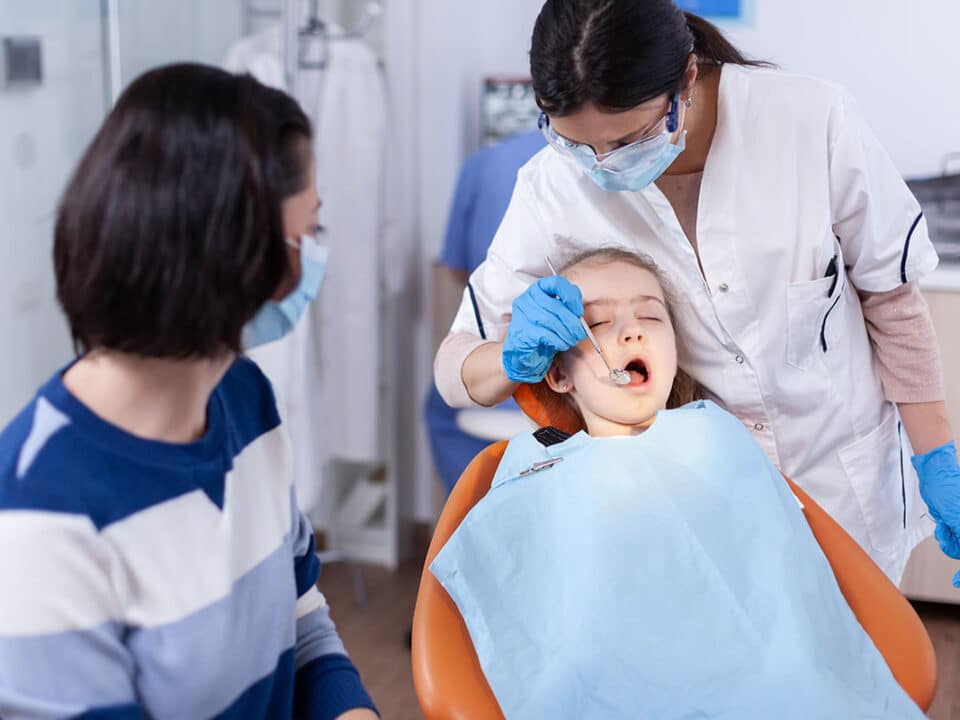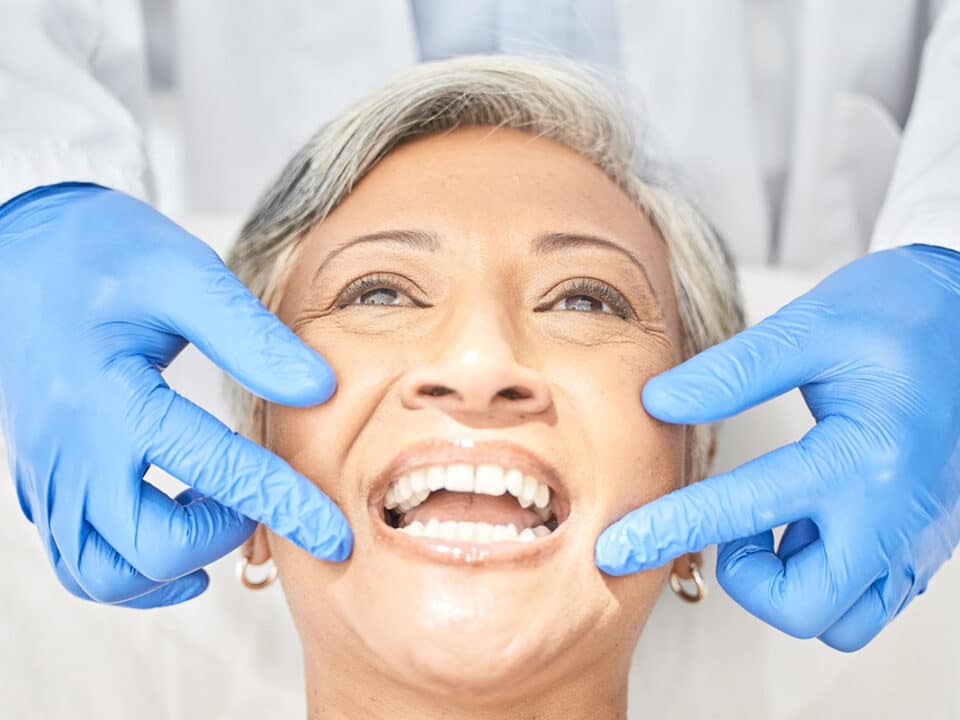A radiant smile is a symbol of health and confidence, but it’s no secret that our daily habits can significantly impact the health of our teeth. From that first sip of your morning coffee to the seemingly harmless act of nibbling on ice cubes, the choices we make can leave a lasting mark on our pearly whites.
In the name of all thing’s oral health, we’ve compiled a list of common habits that, often unconsciously, jeopardize our dental well-being. From nail-biting to indulging in sugary delights, there are a lot of potential culprits behind enamel erosion, cavities, and even tooth fractures. Understanding the impact of these habits is the first step toward preserving your dazzling smile and ensuring your dental health remains a top priority. So, let us help you identify, address, and ultimately break these habits, ensuring your teeth remain strong, healthy, and ready to face the world with a gleaming grin. Read about 17 habits that are ruining your teeth.
Habits that are ruining your teeth

Clenching and grinding your teeth (Bruxism)
One of the main habits that are ruining your teeth is bruxism, the habitual clenching or grinding of teeth, which can significantly damage your teeth over time. The immense force generated during these episodes places excessive pressure on tooth enamel, leading to its gradual erosion. As enamel wears down, teeth become vulnerable to chipping, cracking, and sensitivity. Furthermore, the continuous grinding action can wear down the biting surfaces of teeth, altering their shape and diminishing their structural integrity.
What you can do:
- Identify and eliminate potential stressors in your life
- Practice stress-reduction techniques (meditation, exercise)
- Avoid caffeine and alcohol intake, especially towards the end of the day
- Be mindful of grinding or clenching and make an active effort to stop the habit
- Speak to your dentist about bruxism treatment options
Does biting my nails damage my teeth?
Firstly, the constant biting and pressure can cause teeth to shift out of alignment, resulting in crookedness or misalignment. Secondly, forceful nail biting can weaken tooth enamel, leaving teeth more susceptible to chips, cracks, and wear. Additionally, nail biting can introduce harmful bacteria and germs from your nails into your mouth, increasing the risk of oral infections and gum problems.
What can you do:
Like most habits, they are born from stress, anxiety or boredom. Identifying your triggers lies at the root of addressing this habit. Stress and relaxation techniques can be very effective, so get out and exercise to redirect your energy or meditate to shed stress. It’s also important to keep your nails trimmed, and even painted with a bitter-tasting nail polish so you’ll be less tempted to bite them. Chewing gum or manipulating a stress ball can also help, while the rubber band technique (wearing a band around your wrist and snapping yourself every time you go to bite your nails) is a proven deterrent. Enlisting your friends, family and maybe even co-workers to help you remain cognizant of nail biting is very helpful, too.
Does chewing on ice damage my teeth?
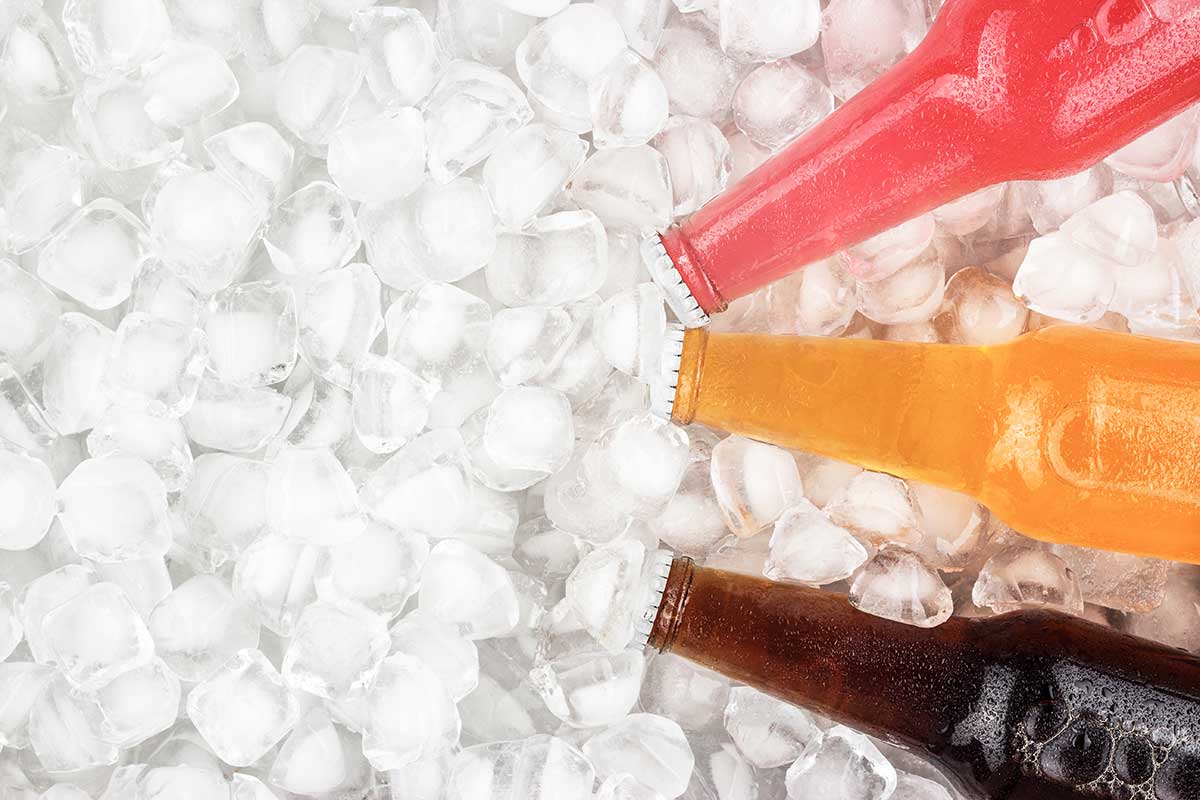
Much like teeth grinding or biting your nails, chewing on ice will damage your teeth in the same way. Ice is hard and the force needed to crunch it can lead to miniscule cracks in the enamel of your teeth, weakening its structure over time. You might not notice the cracks initially, but over time, these can turn into substantial cracks, chips or fractures, not to mention the tooth sensitivity issues that arise from damaged enamel.
What can you do:
While chewing on ice can be caused by anxiety or stress, it’s more often just something that people like to do. It’s also rare that someone will just grab a bowl or ice cubes and start crunching; it’s more of a “munching the ice cubes that are left in your soft drink” kind of habit. As such, it’s one of the easier habits to break because all you need to do is throw away your leftover ice cubes, and the matter is solved.
Using your teeth as a tool will harm your teeth
Do you pop the top off a bottle using your teeth? Or maybe you crack nuts, rip open packages, break plastic seals and stuff like that. Using your teeth instead of the proper tool can lead to tooth damage – cracks, chips, fractures, undue enamel erosion – that could lead to sensitivity or needing fillings, crowns, veneers or even implants. It’s better just to grab the bottle opener than to risk expensive dental procedures or lasting tooth damage.
Neglecting your oral hygiene will affect your oral health

Neglecting oral hygiene can lead to significant dental damage over time. Failing to brush and floss regularly allows harmful bacteria to accumulate on teeth, forming plaque. Plaque produces acids that erode tooth enamel, leading to cavities and tooth decay. Without proper care, gum inflammation can progress to gum disease, causing bleeding, pain, and even tooth loss. Neglecting oral hygiene also contributes to bad breath and stained teeth, affecting oral health and confidence.
What you should do:
Make a plan that includes brushing your teeth twice daily and flossing at least once, and sticking to it. These are the bare minimum requirements of a good oral hygiene routine, but we also recommend rinsing after meals and of course getting regular check-ups and cleanings at your dentist’s office.
Will sugary or acidic foods (and drinks) ruin your teeth?
Sugary or acidic foods can damage your teeth by fueling harmful bacteria in your mouth. Consuming sugary or acidic items provides nourishment for bacteria, which then produce acids as byproducts. These acids can erode tooth enamel, the protective outer layer of your teeth, leading to tooth decay and cavities. Frequent exposure to sugary or acidic foods can weaken enamel over time, making teeth more vulnerable to sensitivity, discoloration, and increased risk of dental problems. Additionally, these foods can promote plaque growth, a sticky film of bacteria, which further accelerates tooth decay.
What you can do:
We understand that it’s tough to avoid these foods and beverages, but we recommend limiting your intake as much as possible. And if you do consume something sugary or acidic, then it’s a great idea to rinse your mouth out with water afterwards to stop much of the adverse effects from happening. A proper oral hygiene routine and regular dental cleanings are also highly recommended.
Will smoking and tobacco use ruin my teeth?
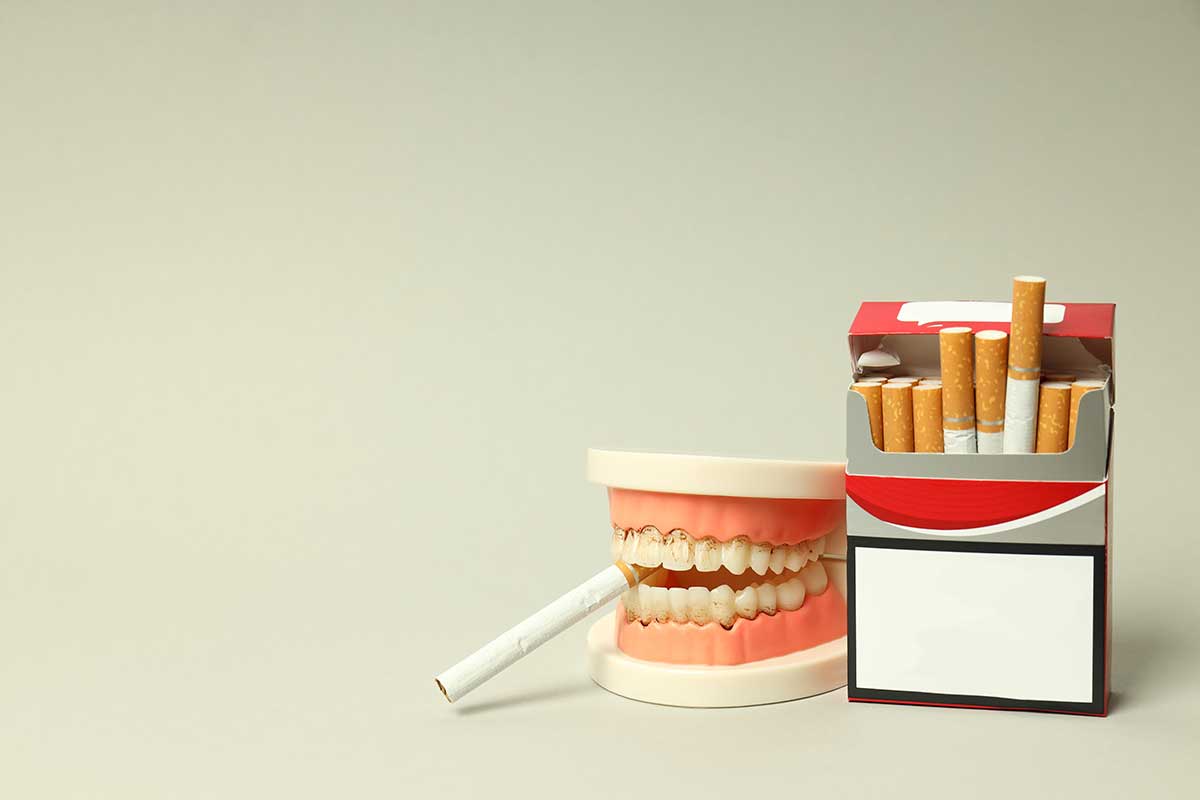
Smoking and tobacco use can wreak havoc on teeth in multiple ways. Firstly, the chemicals in tobacco can stain teeth, leading to yellow or brown discoloration. Secondly, smoking restricts blood flow to the gums, increasing the risk of gum disease, which can lead to gum recession, tooth mobility, and even tooth loss. Additionally, tobacco use weakens the immune system’s response to oral infections, making it more challenging to fight off bacteria that cause cavities and gum disease. Smoking is also a significant contributor to oral cancer, with a high likelihood of affecting the lips, tongue, and throat.
What you should do:
The bottom line is just don’t smoke! It’s as simple as that when it comes to not only your oral health but also your overall well-being. Try using smoking cessation tools like nicotine gum or patches, or ask your loved ones for help keeping you smoke-free. If you do smoke, make sure your oral hygiene routine is on point and that you’re keeping up with your visits to the dentist.
Does alcohol damage teeth?
Alcohol consumption can have detrimental effects on teeth in several ways. Firstly, alcoholic beverages, especially those with high sugar content, can contribute to tooth decay and cavities when consumed frequently. Secondly, alcohol can lead to dehydration, reducing saliva production. Saliva is crucial in neutralizing acids in the mouth and washing away food particles and bacteria. Reduced saliva flow can result in a dry mouth, increasing the risk of tooth decay and gum disease. Furthermore, alcohol can erode tooth enamel due to its acidic nature, making teeth more susceptible to damage. Prolonged excessive alcohol consumption is also associated with a higher risk of oral cancer.
Does binge eating affect my oral health?

Yes, binge eating can significantly affect oral health. During binge episodes, individuals often consume large quantities of sugary and acidic foods, which can lead to tooth decay and cavities. Frequent vomiting, a common behaviour associated with binge eating disorder, exposes teeth to stomach acid, eroding tooth enamel and increasing sensitivity. Additionally, rapid weight fluctuations and nutritional deficiencies linked to binge eating can weaken gum tissues, making them more susceptible to infections and gum disease.
Does not drinking enough water harm teeth?
Water is essential for maintaining proper oral health because it helps to wash away food particles and bacteria that can lead to plaque buildup and tooth decay. Additionally, water helps maintain a balanced pH level in your mouth, which is crucial for protecting tooth enamel. When you don’t consume enough water, your mouth can dry, decreasing saliva production. Saliva is vital in neutralizing acids and providing a protective barrier against tooth decay. You may be more prone to dry mouth without sufficient hydration, increasing the risk of dental issues like cavities and gum disease.
Don’t ignore dental issues
Be it fear of the dentist, cost considerations or just plain being busy – many people get into the habit of neglecting the dentist and ignoring dental issues when they arise. While things like bad breath, plaque build-up, tooth sensitivity, etc., may not seem like a big deal, if left untreated, they can start to impact your oral health.
Drinking coffee, tea or wine too often

The main problem with drinking these coloured beverages is their teeth-staining effects over time. These three drinks are also acidic and can weaken tooth enamel, causing a greater susceptibility to staining. The problem is compounded if a good oral hygiene routine is not followed.
What should you do:
It would help if you practiced oral hygiene to fight tooth staining, including a thorough rinse after consumption. Regular dental cleanings are a must, too, and if you want to brighten your smile, then a professional whitening treatment can do wonders for your pearly whites.
Is it bad for my teeth to snack frequently?
When you snack between meals, you expose your teeth to a continuous cycle of acid attacks. Every time you eat, especially sugary or starchy snacks, harmful bacteria in your mouth produce acids that can erode tooth enamel and lead to cavities. Snacking also prolongs the time when your mouth’s pH level is lower, which creates an environment where bacteria thrive. Additionally, constant snacking may not allow enough time for saliva to neutralize acids and remineralize teeth naturally.
Brushing too hard will damage your tooth enamel
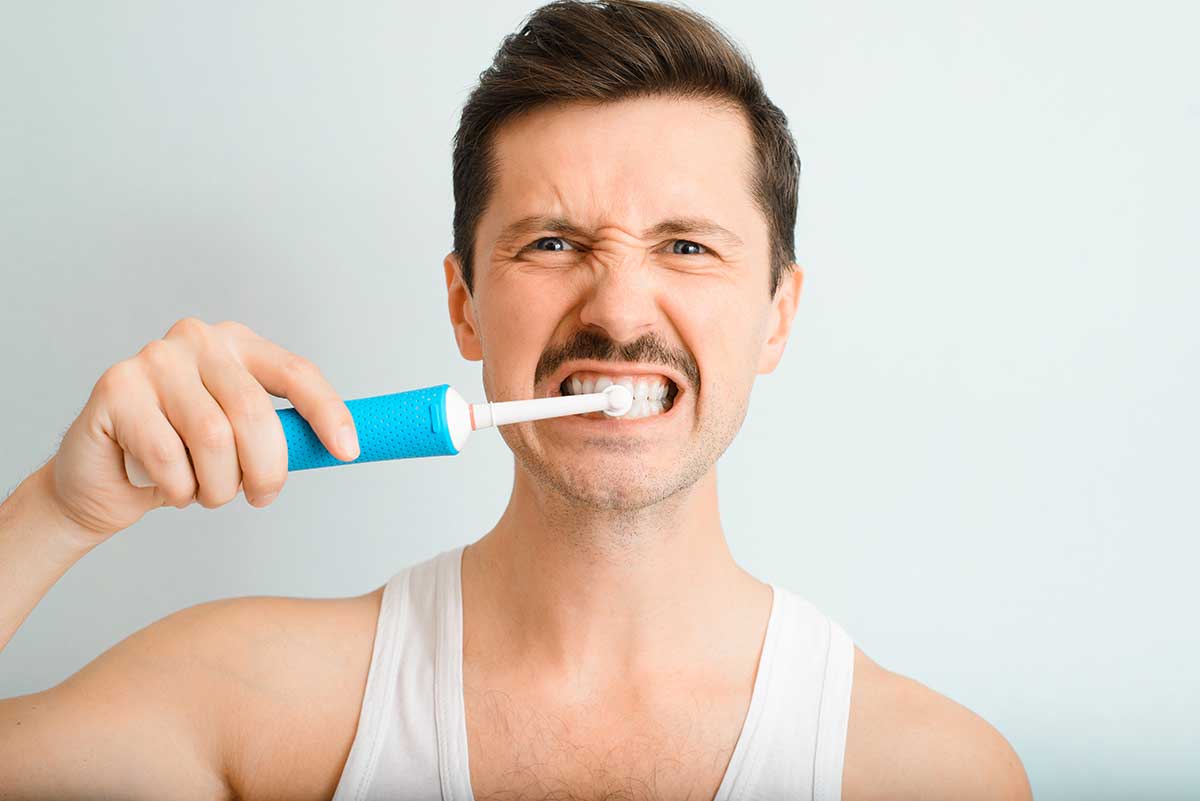
Applying excessive pressure while brushing can lead to several issues. Over time, it can erode tooth enamel, making teeth more susceptible to sensitivity, cavities, and discoloration. Aggressive brushing can also damage gum tissues, causing them to recede and exposing tooth roots, leading to increased sensitivity and an increased risk of decay at the gumline. Additionally, using a hard-bristle toothbrush and vigorous brushing can wear down tooth enamel and potentially cause abrasions on the tooth surface.
You will also need to replace your toothbrush sooner if you brush like a maniac.
What you should do:
There are several things you can try to curb aggressive brushing techniques. First, always use a soft bristle toothbrush as it will be gentler on your teeth and gums. Secondly, you should fix your technique by paying special attention to the pressure you brush with and the direction. Lastly, it might be a good idea to use an electric toothbrush with a pressure sensor to ensure you know the second you start getting too aggressive while you brush.
Skipping dental check-ups
Regular dental checkups and cleanings are essential for maintaining optimal oral health. When you skip these appointments, you miss the opportunity for your dentist to identify and address dental issues in their early stages. This can lead to the progression of problems like cavities, gum disease, and even oral cancer, which can become more challenging and costly to treat over time. Dental cleanings remove plaque and tartar buildup, preventing cavities and gum disease. Regular checkups also allow for early detection of issues, promoting timely intervention and preserving your teeth and oral health.
Ignoring orthodontic problems
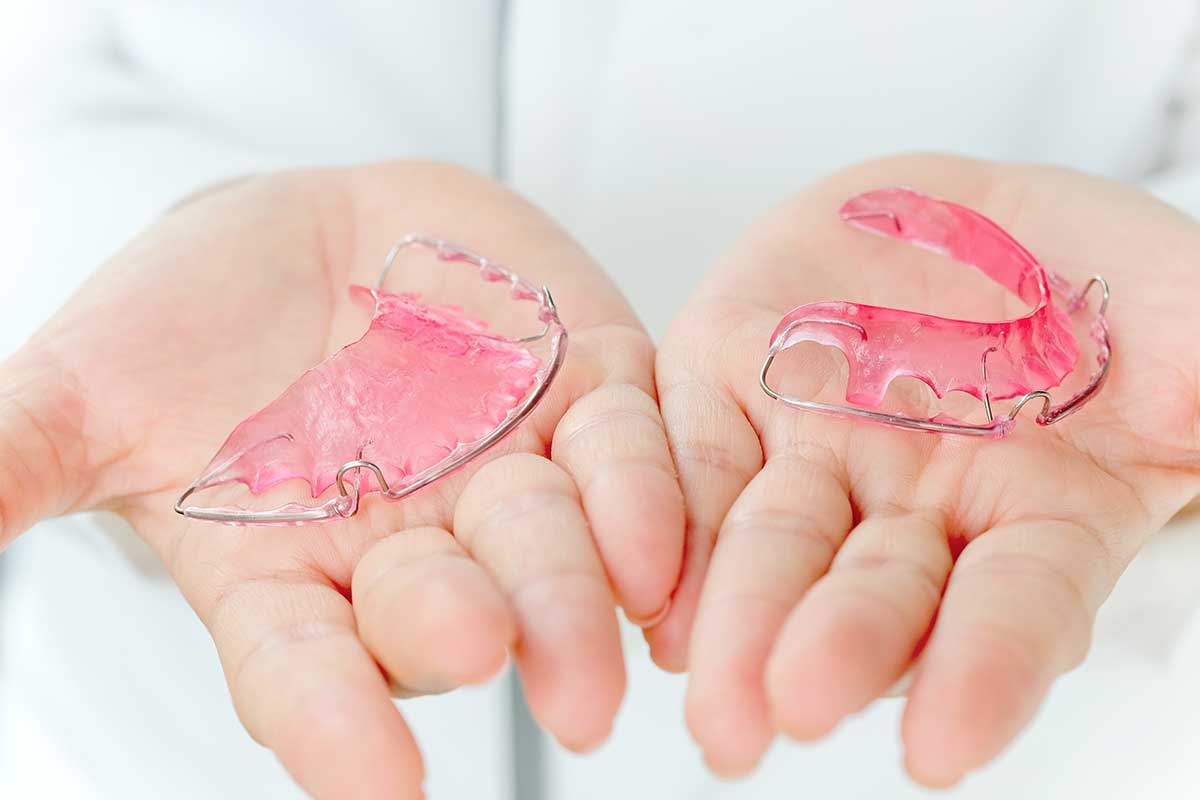
Orthodontic issues may not directly damage your teeth, but they can contribute to various dental problems over time. Misaligned teeth or bite problems can make it challenging to clean your teeth effectively, increasing the risk of plaque buildup, cavities, and gum disease. Additionally, orthodontic issues can lead to uneven wear on your teeth, causing enamel erosion and sensitivity. Overcrowded or misaligned teeth can also affect your bite’s alignment, potentially causing jaw pain, headaches, and temporomandibular joint (TMJ) disorders.
Overuse of teeth whitening products
Overusing whitening agents, especially those with high concentrations of hydrogen peroxide, can weaken tooth enamel, making teeth more sensitive and prone to damage. It can also cause gum irritation and even chemical burns on the mouth’s soft tissues. Additionally, over-the-counter whitening products may not be customized to your specific dental needs, potentially resulting in uneven whitening or over-bleaching specific areas. We recommend opting for professional whitening treatments at your dental office. These will not only be the safest option but also provide the best results by a long shot.
If you have any questions about whether or not something is harmful to your teeth or oral health, please don’t hesitate to reach out to one of our clinic locations. We offer free consultations and follow-up appointments if necessary.
Check us out on Facebook and Twitter for daily information about Oral Health from Martindale Dental, or visit our offices in Hamilton and St. Catharines.
Have more questions?
Please contact us for all inquiries or to book an appointment with one of our convenient clinic locations. We look forward to hearing from you.


